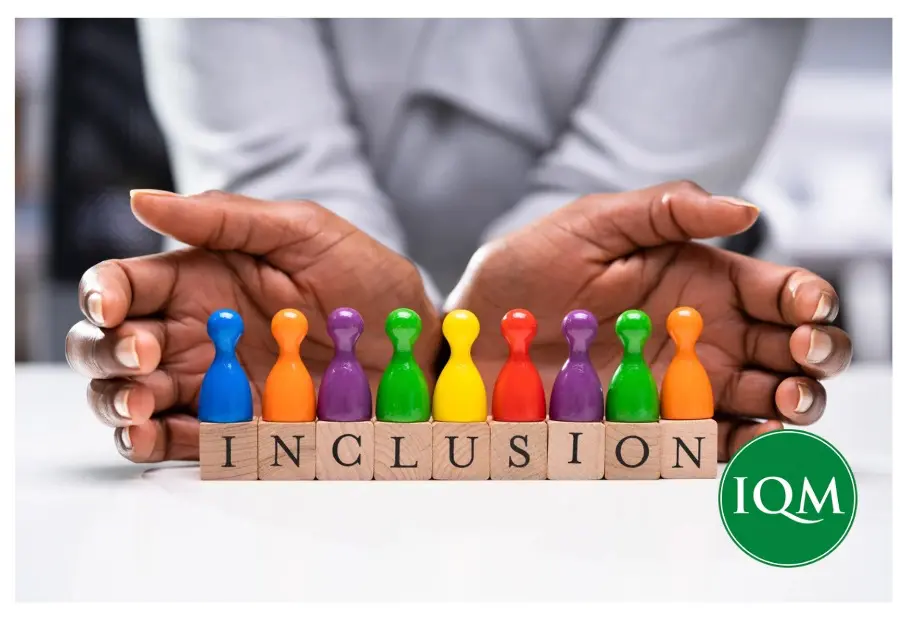Who is IQM?
IQM is the only national inclusion award in the UK. For over 20 years and in over 20 countries, schools, MATs and Local Authorities use the Inclusion Quality Mark to recognise exemplary inclusive practice.
Get in touch for your FREE school information pack today.
What is inclusive education?
August 23, 2025

Inclusion within schools isn’t meant to be an extra bolt-on. Done properly, it sits at the very heart of how a school works.
For schools that invest in inclusive practice, inclusion becomes the culture, the daily rhythm, and the shared expectation. Not a once-a-year INSET topic or a quick line in the school improvement plan.
This article takes a closer look at what inclusive education really means. We’ll break down definitions, explore what inclusive practice in education looks like in real life, and show how schools can make inclusion part of everything they do. Without adding more to your already overloaded to-do list.
Jump ahead to:
Inclusion and inclusive practice: What’s the difference?
Why is inclusive practice important in education?
How can IQM help with inclusive practice in schools?
What is inclusive education?
Education never stands still. New research, changing social needs, and updated policy expectations keep schools on their toes.
These days, inclusive education isn’t just a nice aspiration. It’s what is expected. But what does it actually mean in practice?
Put simply:
Inclusive education is about creating schools where every child can access high-quality learning in a way that works for them. It’s about thinking strategically, planning ahead, and building an environment that works for the full mix of learners in any classroom.
At IQM, we see inclusive education as a whole-school commitment that threads through every layer.
Let’s look at how you might demonstrate inclusive practice in your school.
School inclusive culture
The mindset that every child belongs, is valued, and is expected to achieve. Inclusion isn’t just the SENDCo’s job; it’s everyone’s.
Inclusive school environment
The physical and emotional spaces must make students feel welcome and safe. From classroom displays to quiet spaces to clear signage, the details matter.
Processes and policies
Admissions and pupil enrolment, behaviour policies, staff recruitment, and assessment systems all need to reflect inclusive principles.
Considerations and strategic thinking
Many school leaders plan with inclusion in mind, anticipating diverse needs rather than reacting to problems later.
Evaluation and review
An inclusive school is never “finished.” Regular self-assessment, external validation, and feedback from pupils, parents, and staff help schools keep improving.
What is inclusive practice?
Inclusive education isn’t a programme, a label, or a particular school setting. It’s a living, evolving approach to making sure every child. Regardless of background, ability, language, or life experience, they have the right support to thrive.
If inclusive education is the vision, inclusive practice is how you make it real. It’s the daily actions, decisions, and strategies that back up your school’s inclusive intent.
Inclusive practice in education means:
- Planning lessons so every student can take part meaningfully
- Using inclusive teaching strategies like scaffolding, chunking, modelling, and flexible grouping
- Listening to pupil voice to understand what helps or hinders them
- Training staff to spot hidden barriers (not just for pupils with SEND, but for those affected by EAL needs, social disadvantage, or wellbeing challenges)
- Making sure policies are lived out in the classroom, not just written in a handbook
And crucially, inclusive practice goes beyond SEND, inclusion within schools also covers:
- Emotional and mental health support
- Access for disadvantaged learners
- Opportunities for high-attaining pupils who need stretch and challenge
- Consideration of staff wellbeing and diversity within the workforce
Think of inclusive practice as everything you do to make inclusion visible and tangible: teacher adjustments in the classroom, leadership decisions about resource allocation, lunchtime staff learning to de-escalate conflict, and governors reviewing data for patterns of exclusion.
It’s about joined-up thinking rather than quick fixes.
Inclusion and inclusive practice: What’s the difference?
It’s easy to mix these terms up, but here’s a simple way to separate them:
Inclusion is the intention. The belief and commitment that everyone belongs and should have equal opportunities to succeed.
Inclusive practice is the implementation and impact. The actual steps you take to make that belief visible in everyday school life.
If you’re familiar with Ofsted’s “3 I’s,” you can think of inclusion as the Intention, while inclusive practice in education is the Implementation (what you do) and Impact (what happens as a result).
Example of inclusion in a school:
Inclusion: The school values every pupil equally and wants all children to succeed.
Inclusive practice: Teachers adapt their planning, use assistive technology, or adjust classroom seating to ensure every pupil can engage fully.
Example of inclusion in the workplace:
Inclusion: A company commits to fair recruitment.
Inclusive practice: Job adverts are reviewed for bias, interviewers are trained, and roles are offered with flexible arrangements to widen access.
Understanding this distinction helps schools focus not just on good intentions but on visible actions and measurable outcomes.
Why is inclusive practice important in education?
Every child deserves the chance to flourish, and our understanding of how to achieve that is growing rapidly.
Research into learning, child development, and SEND needs shows that there is no “typical learner.” As a result, inclusive practice in education has never been more important.
The wider pressures:
Local authorities (UK): With high-needs budgets stretched, children are often waiting too long for external support. Local councils need schools to build inclusion into their core offer so that every pupil gets timely help.
Ofsted: Inclusion will now have its own dedicated inspection focus. Schools are expected to demonstrate a strong, whole-school culture of inclusion. Not just isolated examples.
Schools and MATs: MAT CEOs and school leaders are looking closely at how to upskill staff and embed inclusion efficiently, particularly with tight budgets. Building a shared approach to inclusive teaching strategies saves time, money, and improves pupil progress.
Children: At the heart of all this are young people who need to feel they belong. Whether they have SEND, speak a different first language, or require additional support to help them learn in a way that works for them. They need schools where they are understood and supported to succeed.
In short, inclusive practice is not optional. It ensures that every pupil, not just those with formal diagnoses, gets an education tailored to them. It’s about preparing children for life, not just exams.
How can IQM help with inclusive practice in schools?
At IQM, we’ve worked with over 6,500 schools across the UK, Ireland, and internationally to make inclusion more than just a policy. We recognise the exemplary inclusive practice schools thread throughout their culture and daily life. Using our nationally recognised framework.
 Through our three award levels:
Through our three award levels:
Guide schools through a process of reflection, improvement, and celebration. These awards aren’t tick-box exercises. They’re about lasting, creative change that works for your unique setting.
If your school wants to:
- Build a shared culture of inclusion
- Strengthen inclusive teaching strategies
- Gain recognition for your efforts
- Show Ofsted, governors, and parents that you’re committed to every pupil’s success
… then IQM can help.
Want to learn more? Request your FREE school information pack today and discover how IQM can support your journey toward whole-school inclusion.
School stories you’ll like:
The Brow Community Primary School
Al Shohub Private School Abu Dhabi
Other Posts

About IQM
The only national award for inclusion in the UK, IQM has been committed to recognising exemplary inclusive schools for over 20 years and in over 20 countries around the world. The three awards allow schools and organisations to celebrate their inclusive practice against nationally recognised framework.
Site Links
© 2026 Inclusion Quality Mark | website developed & cared for by digidoda




